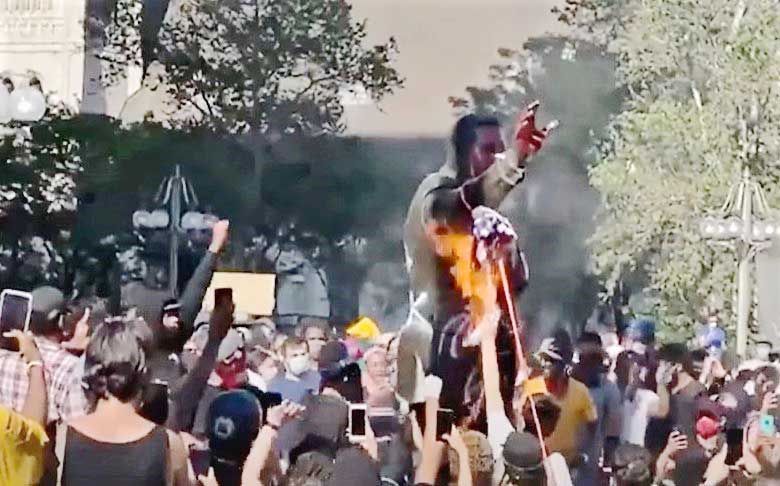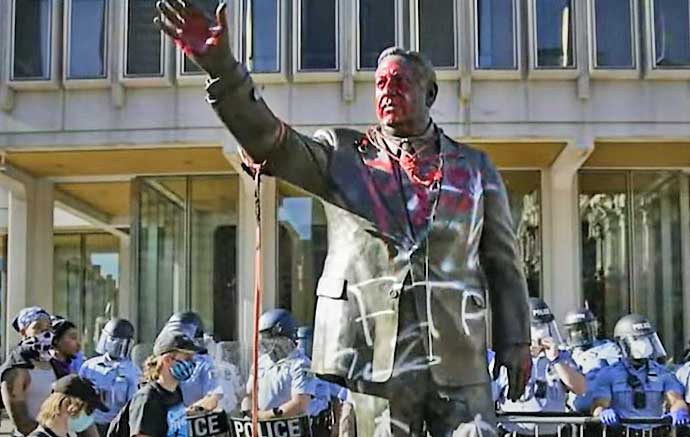In the early hours of May 31, after weekend protests against the nationwide killing of unarmed Black people raged on Philly streets, a City crew was sent to clean scorch marks and graffiti from the 2,000-pound, 10-foot Frank Rizzo statue that guarded the Municipal Services Building. The cleaning of what protesters considered to be a stark symbol of Rizzo’s racist and homophobic regime caused such public scorn that Major Jim Kenney chose to act. Kenney had the statue removed and the mural of Rizzo painted over. The Kenney administration has additionally pledged to eliminate the proposed increase to the police budget.
As the former police commissioner from 1967-1971 and mayor of Philadelphia from 1972-1980, many remember Frank Rizzo as a tyrant who made it his mission to wage war on communities of color and the LGBTQ community. Kenney’s emergency executive order states that the “statue has become a painful symbol of racism, bigotry and police brutality for members of the Black community, the LGBTQ community and many others because of how their communities were treated by the Philadelphia Police Department under Mr. Rizzo’s leadership, and its presence on City property has negatively impacted police-community relations.”

Hailing from South Philly, Rizzo’s rein purported to be tough on crime. Yet, cracking down on crime largely meant sanctioning raids on Black civil rights groups and often lethal police beatings of unarmed Black and Brown people. Rizzo was often quoted using slurs for people of color and LGBTQ folks, whom he considered to be “criminals.” In his dealings with the Black Panthers, he called for members to be “strung up” and for police officers to “spacco il capo,” which is roughly translated from Italian as “break their heads.”
In 1968, Rizzo led a series of raids on gay bars. This action not only criminalized those who identified as LGBTQ but enabled officers to beat and defame LGBTQ folks at will. On the evening of March 8, 1968, a few women went out to the well-known lesbian bar, Rusty’s. According to an eyewitness at the time, patrons were sipping drinks and socializing when the jukebox was suddenly unplugged and the house lights went up. Police swarmed the bar, verbally harassed the women, and quickly booked many of them in jail on bogus drunk and disorderly charges. Luckily, all charges against these women were dropped by the magistrate, but Rizzo certainly made his point: If you were LGBTQ, you would be treated like a criminal.
Because of this legacy, the Kenney administration has long been under pressure to remove Rizzo’s statue. Discussion and controversy around the Rizzo statue began to erupt in the Philadelphia community in 2017 when many southern states began removing Confederate monuments that came to symbolize America’s racist past.
Also due to its racist and homophobic symbolism, protesters have repeatedly tried to defame and even overthrow the monolithic statue. Kenney’s executive order listed that individuals have tried to “to demolish, light on fire, excavate, smash, break, and topple the Statue.” And during the more recent Geroge Floyd protests, people also attempted to destroy it. This is what compelled Kenney to sign an executive order on June 2 to remove the Rizzo statue once and for all. Kenney also had a mural of Rizzo in South Philadelphia painted over so that the wall now stands a blank slate.
Celena Morisson, executive director of the Office of LGBT Affairs said, “As we’ve seen echoed on our social media feeds and in news reports, the removal of the Frank Rizzo statue was a thrilling — but long overdue — moment for Philadelphia. The former mayor and police commissioner left a stain on Philadelphia’s reputation due to his abhorrent treatment of Black people, members of the LGBTQ community and other marginalized folks. I hope that this gesture will be a small step towards healing for our city.”
In the City’s recent press release, the Kenney administration “will work with City Council to reduce the Police Department Budget to FY20 funding levels.” This means that the budget for law enforcement will remain at $726 million for the fiscal year, but not increase. But, this doesn’t seem to be exactly what protestors have in mind: Philly We Rise — a cooperative dedicated to promoting grassroots community organizing in Philadelphia — pointed to the Los Angeles mayor’s announcement to cut the police budget, citing that a comparable budget cut for Philadelphia police would be at least $64 million.
According to Monique Perry, an organizer with Black Lives Matter Philly, the protests aim to raise awareness of systemic racism and proclaim that Black lives do indeed matter. Philly protestors are also making demands that Kenney not only limit increases but dramatically defund the police.
